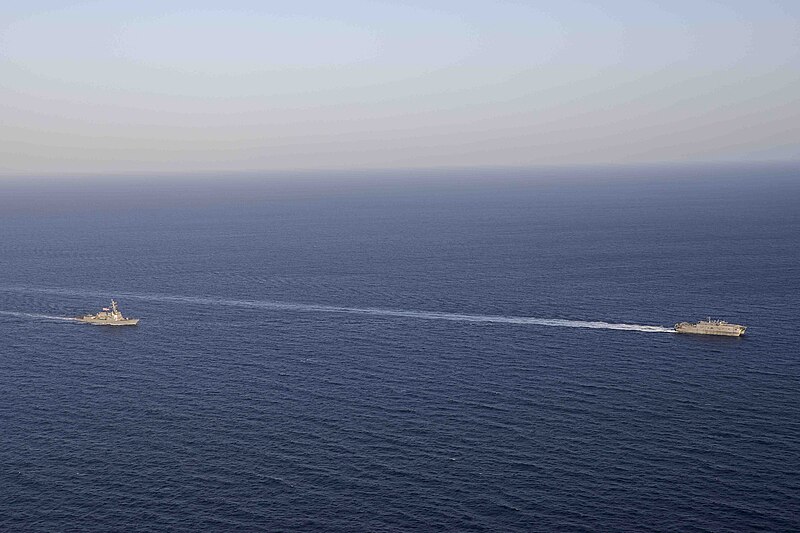
2023 drew to a close with the emergence of a new threat to global trade. The Houthis, an Iran-backed rebel group that controls much of western Yemen, began firing missiles at and attempting piracy attacks on freight vessels in the Red Sea. They had previously launched several missile and drone attacks at Israel, claiming retaliation for Israeli conduct in Gaza, but all attacks directed at Israel itself were intercepted by Israel’s Iron Dome missile defence system or the US navy. However, Norwegian and Indian ships have also been hit by missiles, and an Israeli-owned but Japanese-operated vessel was captured by the Houthis in November, with its crew taken hostage.
2024 dawned with the creation of the aptly-named ‘Operation Prosperity Guardian’, a multinational taskforce including naval ships from the US, UK and Denmark, and supporting officers and intelligence from Norway, the Netherlands, the Seychelles and Bahrain, among others. France, Italy and Spain have also deployed warships to the Red Sea, though these are not part of ‘Prosperity Guardian’. The operation’s aim is to patrol Red Sea waters, escort freighters and deter/secure against further attacks.
The Houthi response to the formation of this task force was simple, and blunt: “The Red Sea will be your graveyard”. They have failed to hit any warships, though not for a lack of trying. Western naval vessels are fairly safe from Houthi attacks due to their advanced technology, but the cost of intercepting Houthi attacks is disproportionately more than the cost of the armaments the Houthis are deploying, so in the long term, the depletion of naval arms will take a financial toll.
Many shipping companies have decided to redirect ships around South Africa, a longer but safer route between Europe and Asia. Others, such as BP, have halted shipments indefinitely. Given the typically constant nature of maritime trade, these delays could lead to a rise in the prices of goods, as products become more scarce. As long as this risk to global shipping remains, ships will be redirected, prices will rise, economies will slow, and the costs to the naval forces patrolling the area will grow.
As long as this risk to global shipping remains, ships will be redirected, prices will rise, economies will slow, and the costs to the naval forces patrolling the area will grow
Continued attacks prompted the US and UK to launch airstrikes on Houthi territory, including on Yemen’s capital city Sana’a, which is under Houthi control. They targeted sites are associated with the production/storage of radars, drones and missiles, and the strikes are an attempt to cripple the ability of the Houthis to attack merchant ships. US warplanes based on the aircraft carrier USS Dwight D. Eisenhower, US ship-launched missiles, and UK aircraft based in Cyprus took part in the operation.
Western involvement in the Yemeni Civil War is not a new phenomenon. The US and UK have been selling weapons, largely aircraft and aerial munitions, to the Saudi-led coalition for years. Some of these have been used to kill civilians in Yemen. Saudi Arabia and its allies intervened in Yemen in 2015, after the civil war erupted the year previous. Along with a harsh air campaign, the coalition attempted to navally blockade Houthi territory, to prevent Iranian weapons shipments being utilised by the Houthis. As well as increasing tensions between Iran and Saudi Arabia, this kick-started one of the worst humanitarian crises in the world today. 2023 did however see the Saudi coalition’s campaign subside, as a ceasefire was agreed.
Evidently, the airstrikes and blockade, which did untold damage to the civilian population, failed to demonstrably weaken the Houthis as intended. If anything, it emboldened their resolve. The blockade failed to stop Iran’s shipments, as the Houthis have deployed Iranian-model anti-ship missiles and drones from reinforced and often underground sites.
The Houthis may be nominally independent, but the proxy nature of their relationship with Iran is important. Other Iranian proxies, like Hezbollah in Lebanon, have freely engaged in attacks which if undertaken directly by Iran would surely result in war between major powers. In this way, Iran can influence events and assert its power without directly being liable for attacks on rivals.
The Houthis may be nominally independent, but the proxy nature of their relationship with Iran is important
Iran has frequently threatened to close the Strait of Hormuz, the vital chokepoint of the Persian Gulf which sees nearly half the world’s oil exports pass through it. It has never followed through, but the threat of oil shortages, the associated economic collapse for oil-rich nations, and bitter memories of the oil crisis of ‘73, are enough to get its rivals to take it seriously.
By threatening the stability of the Red Sea shipping lanes, the Houthis, and Iran by extension, are sending a message that they are not afraid to assert their interests. In terms of Iranian support for Hamas, this has put Iran’s rival, the Saudis, in a difficult position. They too have strained relations with Israel, but they have strong connections to much of the West, as Israel does. Therefore, they’ve taken a neutral, peace-making stance, as a way of appeasing both sides.
The Saudi-Iran rivalry has defined the Middle East for over a decade. Since the Arab Spring in 2011, several civil wars have broken out across the region. Riyadh and Tehran have both aggressively intervened to further their own interests. Yemen was no different.
Now, though, the Iran-backed Houthis have threatened global trade and attacked commercial vessels. Israel’s campaign in Gaza shows little signs of halting, despite Hezbollah and Houthi attacks and mounting international pressure. But with enough willpower, which they clearly have, the Houthis may pose just enough of a threat, even with NATO naval patrols in the area, to bleed the Red Sea dry of shipping for the foreseeable future.


